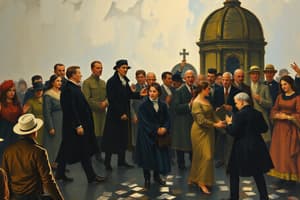Podcast
Questions and Answers
According to Martin Gilens and Benjamin Page, democracy in America functions primarily through the influence of elites and interest groups.
According to Martin Gilens and Benjamin Page, democracy in America functions primarily through the influence of elites and interest groups.
True (A)
Matt Taibbi claims that criminal justice system punishes white collar crimes more severely than street crimes.
Matt Taibbi claims that criminal justice system punishes white collar crimes more severely than street crimes.
False (B)
The theory of pluralism emphasizes the political activity of organized associations and interest groups in American democracy.
The theory of pluralism emphasizes the political activity of organized associations and interest groups in American democracy.
True (A)
Alexis de Tocqueville believed that France was advancing towards a form of democracy similar to that of the United States during the 1830s.
Alexis de Tocqueville believed that France was advancing towards a form of democracy similar to that of the United States during the 1830s.
Hyper-pluralism is one of the three main theories regarding the operation of the American political system.
Hyper-pluralism is one of the three main theories regarding the operation of the American political system.
Pluralism suggests that a single set of interests will invariably dominate public policy.
Pluralism suggests that a single set of interests will invariably dominate public policy.
Hyper-pluralism claims that the government has been captured by the demands of interest groups.
Hyper-pluralism claims that the government has been captured by the demands of interest groups.
Elite theorists argue that all interest groups have equal influence on government decision-making.
Elite theorists argue that all interest groups have equal influence on government decision-making.
According to elite theory, a healthy competition exists among various interest groups in shaping government policies.
According to elite theory, a healthy competition exists among various interest groups in shaping government policies.
The contradictory nature of government policy is used as evidence of a free market of interests as suggested by pluralism.
The contradictory nature of government policy is used as evidence of a free market of interests as suggested by pluralism.
Flashcards are hidden until you start studying
Study Notes
Power Dynamics in U.S. Politics
- Ordinary citizens often align with elites or interest groups to get their needs met, indicating a disjointed democratic process.
- Vast inequities exist across various sectors including economy, criminal justice, healthcare, and war, often affecting the lower and middle classes disproportionately.
Theories About American Politics
-
Pluralism: Originating from Alexis de Tocqueville's observations, this theory asserts that ordinary Americans can freely form or join groups, leading to diverse interests competing for political influence.
- Emphasizes organized groups operating on a level playing field, suggesting no single interest dominates for long.
- Supported by the diversity of interest groups and inter-group competition, especially between business, labor, and environmental factions.
-
Hyper-Pluralism: Proposes that pluralism has devolved into chaos, where the government acquiesces to conflicting demands of myriad interest groups.
- Critiques the effectiveness of government policy that often embodies contradictory practices, like subsidizing fossil fuels while regulating emissions.
- Theodore Lowi termed this dysfunction as "interest-group liberalism," indicating a system overwhelmed by competing interests.
-
Elite Theory: Asserts that a small and affluent power elite dominates American politics and decision-making processes.
- Highlights the influence of organized business and military interests, suggesting that policies cater to this elite class.
- Features interlocking relationships among business leaders, corporate boards, and owners of influential media, allowing them to maintain control over political landscapes.
Key Insights
- The U.S. political landscape is characterized by varying degrees of influence, inequity, and competing interests.
- Class disparities strongly affect governance and policy outcomes, challenging the notion of a level playing field.
- Historical precedent of elite dominance is evidenced throughout American history, as articulated by notable thinkers like Noam Chomsky.
Studying That Suits You
Use AI to generate personalized quizzes and flashcards to suit your learning preferences.




